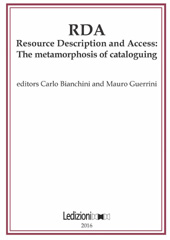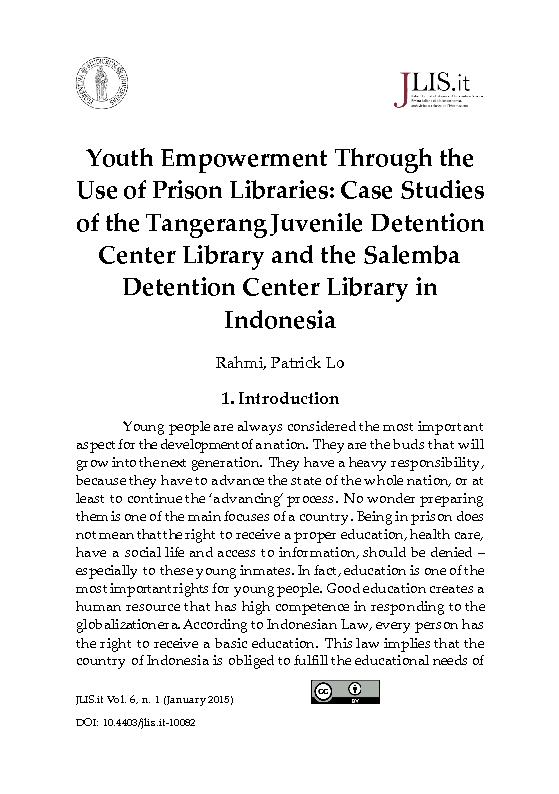Youth Empowerment Through the Use of Prison Libraries : Case Studies of the Tangerang Juvenile Detention Center Library and the Salemba Detention Center Library in Indonesia
183-206 p.
È ampiamente riconosciuto che le bibliteche giocano un ruolo positivo e importante nella vita dei prigionieri, così come con altre persone. Le biblioteche non forniscono solo risorse per il supporto dei vari programmi educazionali, ricreativi e di assistenza sociale, ma creano anche opportunità per i prigionieri di acquisire nuove competenze di cui possono aver bisogno una volta lasciata la prigione. Secondo il Ministro della Giustizia e dei Diritti Umani dell'Indonesia, a partire dal 2013, ci sono 4.622 bambini in 16 diverse prigioni indonesiane. Tali statistiche mostrano come ci sia un grande bisogno all'interno di queste prigioni di biblioteche fornite e con buon personale, al fine di supportare i bisogni educazionali, ricreazionali e psicologici dei bambini imprigionati.
Lo scopo di questo studio consiste nell'esaminare i bisogni pratici, sociali, ricreazionali, educazionali, psicologici e spirituali dei giovani detenuti in merito all'uso delle collezioni, attrezzature e servizi della Tangerang Juvenile Detention Center Library (JDC) e della Salemba Detention Center Library. [Testo dell'editore].
It is widely acknowledged that libraries play a positive and important role in the lives of prisoners, just as they do with other people. They do not only provide resources to support various educational, recreational and welfare programs, but they also create opportunities for prisoners to acquire new skills, skills that they may need once they leave prison. In addition, prison libraries also help address various psychological issues, attitude problems, as well as other difficulties in coping with prison life. According to the Ministry of Law and Human Rights of Indonesia, as of 2013, there are 4,622 children in 16 different prisons in Indonesia.
Such statistics show that there is a great need for well-resourced and well-staffed libraries inside these prisons in order to support the educational, recreational, and psychological needs of imprisoned children. It is evident that the existence of prison libraries and its library collections, facilities, as well as other services could serve as effective rehabilitation for the prisoners and the detainees – to help them develop awareness of their own actions, as well as associated risks and consequences. The purpose of this study is to examine the practical, social, recreational, educational, psychological, and spiritual needs of detained juvenile delinquents in regards to using the collections, facilities and services at the Tangerang Juvenile Detention Center Library and the Salemba Detention Center Library.
This study is based on informational interviews conducted with the Head Librarians at the Tangerang Juvenile Detention Center Library (JDC) and the Salemba Detention Center Library. During these interviews, various problems and challenges related to ethics, professionalism, and other professional issues associated to working as a prison librarian, were discussed. Other issues related to staffing, organizational structure, facilities and the resource situation of the Tangerang Juvenile Detention Center Library and the Salemba Detention Center Library were also addressed. [Publisher's Text].
-
Articles from the same issue (available individually)
-
Information
ISSN: 2038-1026
DISCIPLINES
KEYWORDS
- Youth engagement, Library collections, Prison library, Human rights



